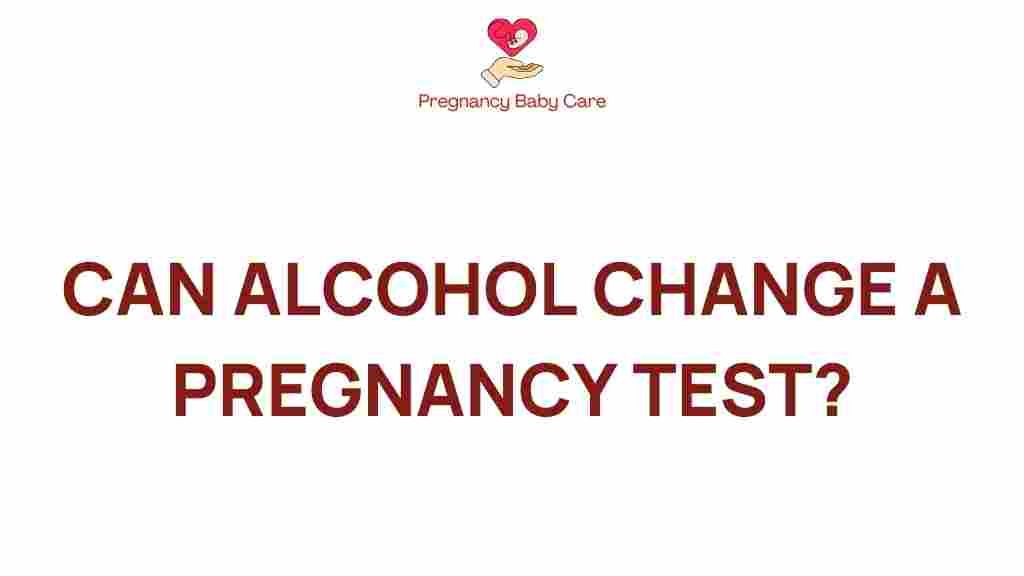Can Alcohol Influence the Accuracy of Your Pregnancy Test?
Understanding the relationship between alcohol consumption and the accuracy of pregnancy tests is crucial for women’s health, particularly for those who are trying to conceive or suspect they might be pregnant. Pregnancy tests are designed to detect the hormone human chorionic gonadotropin (hCG) in urine, which is typically present shortly after implantation if pregnancy occurs. However, various factors can influence the accuracy of these tests, including alcohol consumption. In this article, we’ll explore how alcohol may impact pregnancy test results, the science behind these tests, and the implications for women’s health.
The Science Behind Pregnancy Tests
Pregnancy tests work by detecting the presence of hCG in urine. This hormone is produced by the placenta shortly after a fertilized egg attaches to the uterine lining. Most home pregnancy tests are over 99% accurate when used correctly, especially after a missed period. However, several factors can affect the accuracy of these tests:
- Timing of the test: Testing too early can lead to false negatives.
- Test sensitivity: Different brands may have varying sensitivity levels.
- Improper use: Following the instructions carefully is essential for accurate results.
- Alcohol consumption: While not directly inhibiting hCG detection, it can affect overall health and hormone levels.
How Alcohol May Affect Pregnancy Test Results
While there is no direct evidence that alcohol consumption causes false positives on a pregnancy test, there are some indirect ways it might influence the results:
- Dehydration: Alcohol can lead to dehydration, which may concentrate urine. This could potentially affect the test’s ability to detect hCG accurately.
- Health impacts: Excessive alcohol consumption can lead to hormonal imbalances that may affect menstrual cycles and ovulation, potentially complicating the timing of testing.
- False sense of security: Women may consume alcohol while believing they are not pregnant, leading to risky behavior and health consequences.
Understanding False Positives and Their Causes
False positives are when a pregnancy test indicates a positive result when the individual is not pregnant. Here are the common causes:
- Chemical pregnancies: These occur when an embryo implants but does not develop, often resulting in a very early miscarriage.
- Medications: Certain medications, especially those containing hCG, can cause false positives.
- Medical conditions: Conditions such as ovarian cysts or certain cancers can lead to elevated hCG levels.
- Improper testing: Not following the test instructions can lead to inaccurate results.
Testing Methods for Early Detection
There are various testing methods available for early detection of pregnancy, each with its pros and cons:
Home Pregnancy Tests
These tests are convenient and can be done at home. They are generally reliable if used correctly, especially when testing after a missed period. For optimal results:
- Test with first-morning urine for higher concentration of hCG.
- Follow the instructions precisely.
- Check the expiration date of the test.
Blood Tests
Blood tests are conducted in a medical setting and can detect pregnancy earlier than urine tests. They can also measure the exact amount of hCG, providing more information about the pregnancy’s viability. There are two types of blood tests:
- Qualitative: This test simply gives a yes or no answer regarding pregnancy.
- Quantitative: This measures the exact level of hCG in the blood, which can help track the progression of the pregnancy.
Troubleshooting Pregnancy Test Results
If you receive unexpected results from a pregnancy test, consider the following troubleshooting tips:
- Retest: Wait a few days and retest, especially if you tested early.
- Check with a healthcare provider: If there’s doubt about the result, a blood test can provide clarity.
- Review medications: Check if any medications you are taking could affect test results.
- Assess health conditions: Consult a healthcare professional if you have underlying health issues that could affect hormone levels.
The Importance of Women’s Health and Alcohol Awareness
Understanding the potential influence of alcohol on pregnancy tests is part of broader women’s health awareness. Women who are trying to conceive or suspect they may be pregnant should consider the following:
- Limit alcohol consumption: Alcohol can have harmful effects on a developing fetus. If pregnancy is suspected or planned, reducing alcohol intake is recommended.
- Stay informed: Keep up to date with health information regarding pregnancy and alcohol.
- Seek support: Consult with healthcare professionals about concerns related to alcohol and pregnancy.
For more information on women’s health, you can visit WomensHealth.gov.
Conclusion
While alcohol consumption does not directly cause false positives on pregnancy tests, it can affect overall health and hormone levels, which may complicate the accuracy of testing. Women should be mindful of their alcohol intake, especially if they are trying to conceive or suspect pregnancy. By understanding how pregnancy tests work and the factors that can influence their accuracy, women can make informed decisions about their health and well-being. Always consult with a healthcare provider for personalized advice and guidance regarding pregnancy and alcohol consumption.
For further reading on pregnancy tests and their accuracy, check out this resource: Understanding Pregnancy Tests.
This article is in the category Pregnancy and created by PregnancyBabyCare Team
